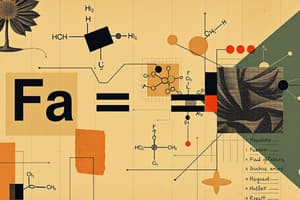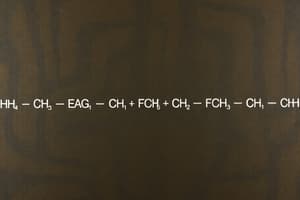Podcast
Questions and Answers
What did John Dalton propose in the early nineteenth century?
What did John Dalton propose in the early nineteenth century?
- Atoms of a given element have different masses and chemical properties.
- Atoms don't have defined mass or chemical properties.
- Atoms of different elements are identical in mass and chemical properties.
- Atoms of a given element are identical in mass and chemical properties. (correct)
Which particle has a positive electrical charge and a mass similar to that of a Hydrogen atom?
Which particle has a positive electrical charge and a mass similar to that of a Hydrogen atom?
- Isotope
- Electron
- Proton (correct)
- Neutron
What is the smallest particle of an element?
What is the smallest particle of an element?
- Molecule
- Neutron
- Atom (correct)
- Proton
What is the atomic number defined as?
What is the atomic number defined as?
What are isotopes?
What are isotopes?
What holds the constituent atoms together in polyatomic molecules?
What holds the constituent atoms together in polyatomic molecules?
Which type of substances do not consist of ions and do not conduct electricity?
Which type of substances do not consist of ions and do not conduct electricity?
How are formulas of substances written to denote the number of atoms of an element in the substance?
How are formulas of substances written to denote the number of atoms of an element in the substance?
What is the charge on the ammonium ion (NH4+)?
What is the charge on the ammonium ion (NH4+)?
In the compound CaO, what does 'O' stand for?
In the compound CaO, what does 'O' stand for?
What does molarity (M) measure in a solution?
What does molarity (M) measure in a solution?
How is normality (N) defined in a solution?
How is normality (N) defined in a solution?
What does weight percent express in terms of concentration?
What does weight percent express in terms of concentration?
In a 5% (v/v) aqueous solution, what does 'v/v' represent?
In a 5% (v/v) aqueous solution, what does 'v/v' represent?
What does 'ppm' stand for in expressing concentration?
What does 'ppm' stand for in expressing concentration?
'Parts per million' is equivalent to how many mg/L for dilute aqueous solutions with a density of approximately 1.00 g/mL?
'Parts per million' is equivalent to how many mg/L for dilute aqueous solutions with a density of approximately 1.00 g/mL?




